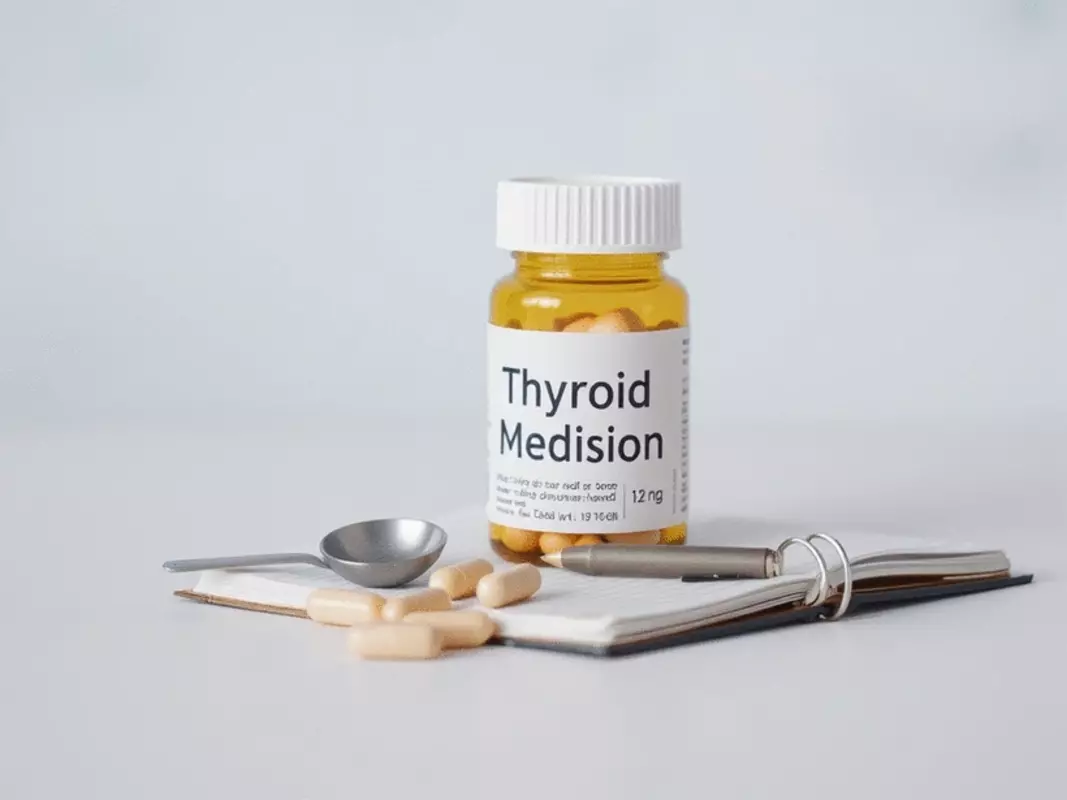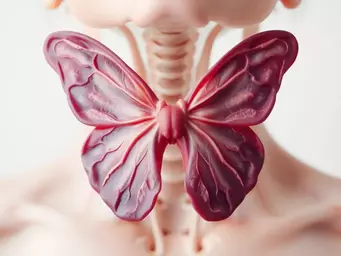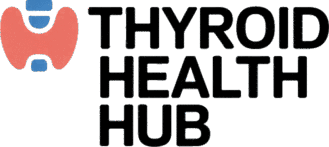Thyroid Function Explained Simply
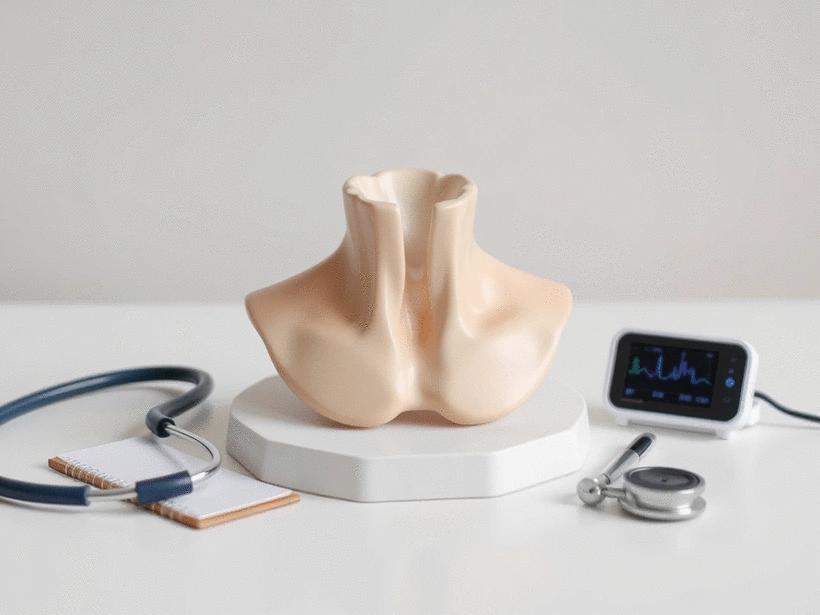
Did you know your thyroid gland is often referred to as the body's energy thermostat? Its proper function is crucial for maintaining energy levels and overall health. Let's delve into what you can learn about this small but mighty gland!
What You Will Learn
- The thyroid gland regulates metabolism, energy levels, and hormonal balance in the body.
- Key hormones produced by the thyroid include T3 (Triiodothyronine) and T4 (Thyroxine), which directly affect your metabolic rate.
- Common thyroid disorders, such as hypothyroidism and hyperthyroidism, can significantly impact your health and well-being.
- Simple lifestyle changes, such as a balanced diet and regular check-ups, can help maintain healthy thyroid function.
Understanding Thyroid Hormones and Their Actionable Steps
The thyroid gland produces essential hormones (T3, T4) which are regulated by TSH. Maintaining a healthy thyroid involves a balanced diet, exercise, stress management, and regular check-ups. See the breakdown below:
Key Thyroid Hormones
- • T3 (Triiodothyronine): More potent, increases metabolic rate.
- • T4 (Thyroxine): Primary hormone, converted to T3.
- • TSH (Thyroid Stimulating Hormone): Regulates T3/T4 production.
Actionable Steps for Thyroid Health
- • Balanced Diet: Rich in iodine, selenium, zinc.
- • Stay Active: Regulates hormones, improves metabolism.
- • Manage Stress: Yoga, meditation techniques.
- • Regular Check-Ups: Monitor thyroid function yearly.
- • Educate Yourself: Stay informed with reliable sources.
Understanding the Basics of Thyroid Function
Welcome to the fascinating world of the thyroid! Your thyroid gland, located at the base of your neck, plays a crucial role in regulating various functions in your body. Think of it as your body's energy thermostat, managing metabolism and influencing how your body utilizes energy. When your thyroid is functioning well, everything runs smoothly, but when it's not, you may experience a host of health issues.
This small yet powerful gland produces hormones that affect nearly every cell in your body, making its proper functioning essential for your overall health. Have you ever wondered how this little gland influences your daily energy levels and mood? Let’s explore!
What is the Thyroid Gland and Its Role in the Body?
The thyroid gland is butterfly-shaped and sits just below your Adam's apple. It produces hormones that are vital for maintaining your body's metabolism, which is how your body converts what you eat into energy. The thyroid gland produces thyroxine (T4) and triiodothyronine (T3), which help regulate your heart rate, blood pressure, and body temperature. For a deeper dive into its vital functions, you can explore resources like the National Center for Biotechnology Information (NCBI), which provides comprehensive information on thyroid physiology.
- Location: The thyroid is located in the neck, right below the larynx.
- Structure: It consists of two lobes connected by a narrow isthmus.
- Function: It regulates metabolism, energy levels, and overall hormonal balance.
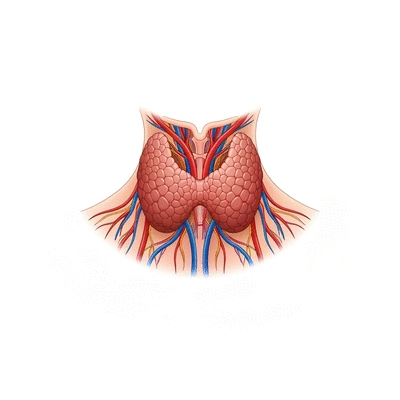
Understanding the structure and function of the thyroid can help demystify its role in your health journey. If you ever feel off-balance, consider how your thyroid might be influencing your well-being!
Key Thyroid Hormones: T3, T4, and TSH Explained
Now that we know the thyroid's role, let’s dive into the key hormones it produces: T3, T4, and Thyroid Stimulating Hormone (TSH). T4, which is produced in greater quantities, is converted into T3, the more active form of the hormone. Together, they work to control your body's metabolism. For more detailed information on these hormones and their functions, the Endocrine Society offers valuable insights into thyroid hormone production and regulation.
- T3 (Triiodothyronine): This hormone is more potent and is responsible for increasing your metabolic rate.
- T4 (Thyroxine): The primary hormone produced by the thyroid, which is converted to T3 in the body.
- TSH (Thyroid Stimulating Hormone): Produced by the pituitary gland, it regulates the production of T3 and T4.
These hormones play an essential role in maintaining health. If you’ve ever felt unusually tired or experienced weight fluctuations, it might be time to have your thyroid levels checked. At Thyroid Health Hub, we’re here to help you navigate these complex topics!
Exploring Thyroid Disorders: Symptoms and Causes
Understanding how your thyroid functions is critical, but equally important is recognizing when something goes wrong. Thyroid disorders can manifest in various forms, impacting your daily life. Let’s take a closer look at some common thyroid disorders. For a comprehensive overview of common thyroid diseases, including their symptoms and causes, consider consulting resources like MedlinePlus, a service of the National Library of Medicine.
Pro Tip
Did you know? Regularly monitoring your thyroid hormone levels can help catch potential issues early. Consider scheduling a blood test annually, especially if you experience symptoms like fatigue or weight fluctuations. Being proactive about your thyroid health can lead to better management and improved well-being!
Summarizing Key Takeaways on Thyroid Function
Understanding how your thyroid functions is crucial for your overall health. The thyroid gland plays an essential role in regulating your metabolism, growth, and energy levels. Being aware of its function helps you recognize symptoms of disorders like hypothyroidism and hyperthyroidism—leading to better management of your health.
As an endocrinologist, I've seen firsthand how vital it is for patients to educate themselves about their thyroid health. By recognizing the signs and symptoms, individuals can take proactive steps towards better health and well-being.
Frequently Asked Questions About Thyroid Health
Q1: What is the primary function of the thyroid gland?
A1: The thyroid gland's primary function is to regulate metabolism, energy levels, and hormonal balance in the body, acting as the body's "energy thermostat."
Q2: What are the key hormones produced by the thyroid gland?
A2: The key hormones are T3 (Triiodothyronine) and T4 (Thyroxine). TSH (Thyroid Stimulating Hormone), produced by the pituitary gland, regulates their production.
Q3: What are some common thyroid disorders?
A3: Common thyroid disorders include hypothyroidism (underactive thyroid) and hyperthyroidism (overactive thyroid), both of which can significantly affect health and well-being.
Q4: What lifestyle changes can support healthy thyroid function?
A4: Simple lifestyle changes such as eating a balanced diet rich in iodine, selenium, and zinc, staying active, managing stress, and having regular check-ups can help maintain healthy thyroid function.
Q5: When should I consult an endocrinologist for thyroid issues?
A5: You should consider consulting an endocrinologist if you experience unexplained weight gain or loss, persistent fatigue, changes in skin, hair, or mood, or if you have a family history of thyroid disease.
Actionable Steps for Maintaining Healthy Thyroid Function
Maintaining healthy thyroid function involves a combination of lifestyle choices and regular medical check-ups. Here are some actionable steps you can take:
- Eat a Balanced Diet: Incorporate foods rich in iodine, selenium, and zinc to support thyroid health.
- Stay Active: Regular exercise can help regulate hormones and improve metabolism.
- Manage Stress: Practice relaxation techniques such as yoga or meditation to keep stress levels in check.
- Regular Check-Ups: Schedule yearly visits with your healthcare provider to monitor thyroid function.
- Educate Yourself: Stay informed about thyroid health through reliable sources, like Thyroid Health Hub.
By implementing these steps, you can take charge of your thyroid health and enhance your quality of life. Remember, small changes can lead to significant improvements!
Resources for Further Learning About Thyroid Health
It's essential to have access to reliable resources for ongoing education about your thyroid health. Here are some valuable links you might find helpful:
- American Thyroid Association - A source for comprehensive thyroid information and research.
- Thyroid Foundation - Offers educational resources and support for thyroid patients.
- Thyroid Health Hub - Our own platform providing expert-reviewed articles and guides.
- PubMed - A database of scientific studies and articles related to thyroid health.
Utilizing these resources can empower you with knowledge and support as you navigate your thyroid health journey.
Understanding the Role of Endocrinologists in Thyroid Management
Consulting with an endocrinologist is an essential step if you suspect any thyroid-related issues. Endocrinologists specialize in hormonal imbalances and can provide targeted care for your thyroid health. Here are some situations where you should consider reaching out:
- If you experience unexplained weight gain or loss.
- If you have persistent fatigue despite adequate sleep.
- If you notice changes in your skin, hair, or mood.
- If you have a family history of thyroid disease.

As a dedicated endocrinologist, I strive to help my patients understand their diagnoses and work collaboratively to develop personalized treatment plans. Remember, you don’t have to face thyroid issues alone!
Thyroid Awareness Month: Why It Matters and How to Get Involved
Every year, Thyroid Awareness Month aims to raise awareness about thyroid health and its impact on overall well-being. This initiative encourages individuals to learn more about their thyroid function and the disorders that can arise. Here are some ways you can get involved:
- Share Information: Use social media to spread awareness about thyroid health.
- Participate in Events: Join local or virtual events to connect with others and learn more.
- Support Research: Consider donating to organizations focused on thyroid research and education.
- Engage with Your Community: Organize or attend support groups where individuals can share their experiences and insights.
By participating in Thyroid Awareness Month, you can help others understand the importance of thyroid health while empowering yourself and your community!
Recap of Key Points
Here is a quick recap of the important points discussed in the article:
- Thyroid Function: The thyroid gland regulates metabolism and energy levels, producing vital hormones such as T3 and T4.
- Key Hormones: T3 (active hormone) boosts metabolism, while T4 (main hormone) is converted into T3. TSH regulates their production.
- Thyroid Disorders: Recognizing symptoms of disorders like hypothyroidism and hyperthyroidism is crucial for maintaining health.
- Actionable Steps: Eating a balanced diet, staying active, managing stress, and regular check-ups can support thyroid health.
- Consultation: Seek advice from an endocrinologist if you experience symptoms related to thyroid dysfunction.



